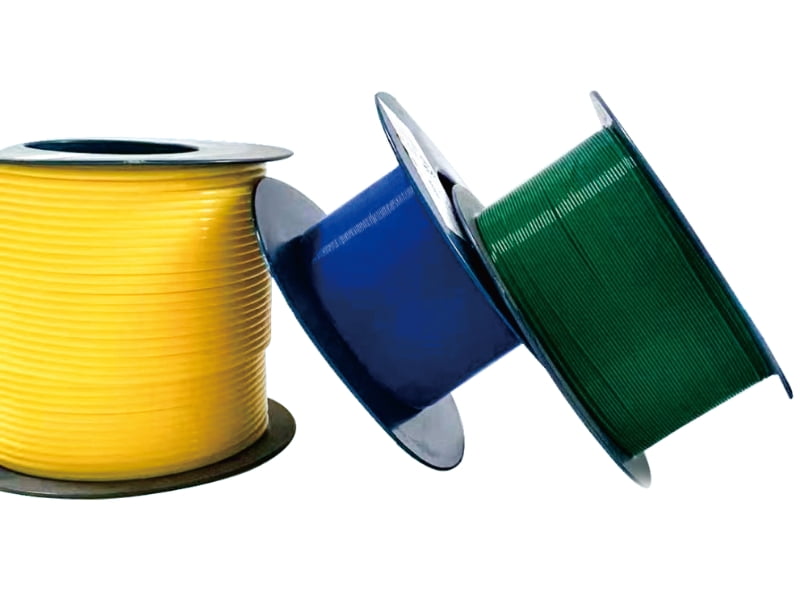PTFEチューブとは何ですか?
ポリテトラフルオロエチレン (PTFE) チューブは,優れた耐薬品性,熱安定性,低摩擦特性で知られるフッ素ポリマー チューブです。PTFE チューブは,高純度 PTFE 樹脂から押し出し加工によって製造され,滑らかな表面仕上げの半透明から不透明の白色チューブになります。この材料のユニークな分子構造は,フッ素原子に囲まれた炭素原子で構成されており,化学的に最も不活性な材料の 1 つです。

PTFE チューブの主な特性は次のとおりです。
耐薬品性: 高温での溶融アルカリ金属およびフッ素を除くほぼすべての化学物質に対して耐性があります(工業用化学物質の 95% 以上と互換性があります)。
温度範囲: -200°c ~ +260°c (-328°f ~ +500°f) の連続使用温度
絶縁強度: 標準壁厚の場合19.7 kv/mm(500 v/mil)
摩擦係数: 0.05~0.10(固体材料の中で最も低い値の一つ)
抗張力: 配合に応じて20~35 mpa(2900~5000 psi)
破断伸び: 200~400%
吸水性: <0.01% (24h immersion)
surface energy: 18.5 dynes/cm (extremely non-stick)
applications of ptfe tubing
the unique combination of properties makes ptfe tubing suitable for demanding applications across multiple industries:
chemical processing
ptfe tubes serve as liners or transfer lines for aggressive chemicals including concentrated acids (96% sulfuric acid, 37% hydrochloric acid), strong bases (50% sodium hydroxide), and organic solvents (acetone, toluene). their 0% permeability to most chemicals prevents contamination.
semiconductor manufacturing
in cleanroom environments, ultra-high purity ptfe tubing (with <0.1 ppb metallic impurities) transports high-purity chemicals and gases. the material's outgassing rate of <1×10⁻⁹ torr·l/s·cm² makes it ideal for vacuum systems.
medical and pharmaceutical
medical-grade ptfe tubing (usp class vi compliant) is used in catheters, drug delivery systems, and bioprocessing equipment. its non-thrombogenic surface reduces platelet adhesion by 90% compared to other polymers.
automotive and aerospace
ptfe fuel lines withstand ethanol-blended fuels and maintain flexibility at -40°c. in aircraft, ptfe tubing is used in hydraulic systems (withstanding 3000 psi at 200°c).
electrical insulation
ptfe tubing provides volume resistivity >10¹⁸ Ω·cm for high-voltage applications. its dielectric constant of 2.1 remains stable from -40°c to 260°c.
maintenance and care of ptfe tubes
proper maintenance extends ptfe tubing lifespan beyond its typical 10-15 year service life in most applications:
cleaning procedures
for chemical contamination:
immerse in 10% nitric acid solution at 60°c for 30 minutes
rinse with deionized water (18 mΩ·cm resistivity)
dry with nitrogen gas (99.999% purity) at 80°c
for particulate contamination:
ultrasonic clean in isopropyl alcohol (ipa) at 40 khz for 10 minutes
purge with filtered compressed air (0.1 μm filtration)
installation best practices
maintain bend radius >5×od to prevent kinking
use ptfe-compatible fittings (316l stainless steel or peek)
avoid axial loads >50 n during assembly
storage conditions
store at 15-25°c in 40-60% rh
protect from uv exposure (causes <0.1% degradation/year)
keep in original packaging until use to prevent surface contamination
performance monitoring
regularly inspect for:
wall thickness reduction (>10% decrease indicates replacement)
surface cracks (use 10× magnification)
changes in flexibility (test at -20°c for critical applications)



 English
English

